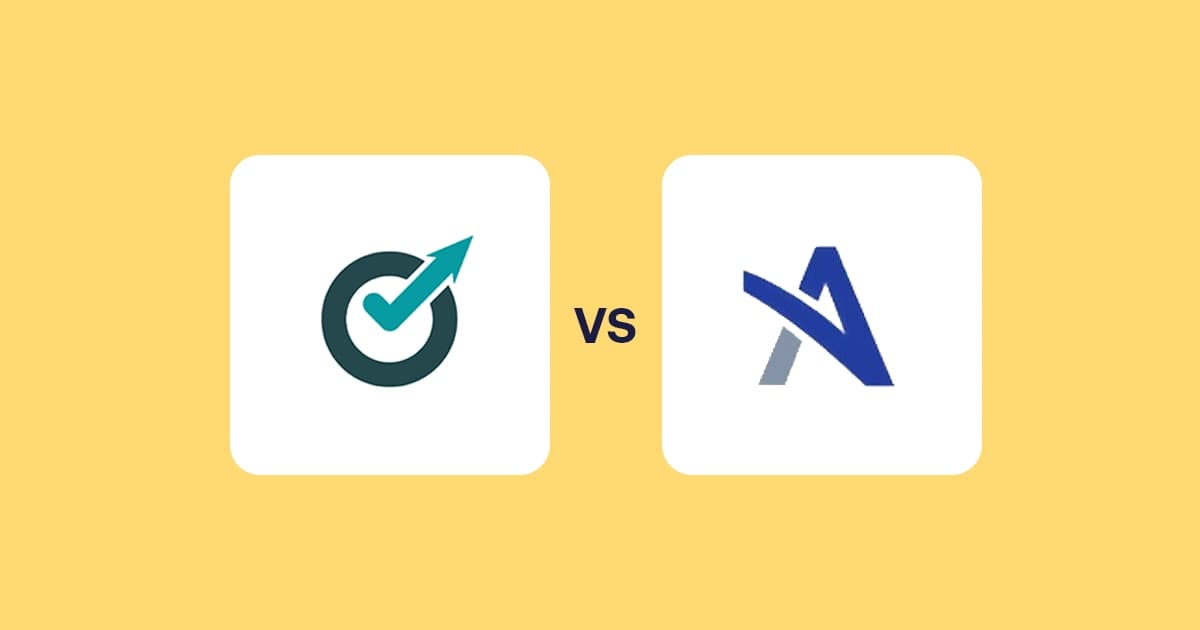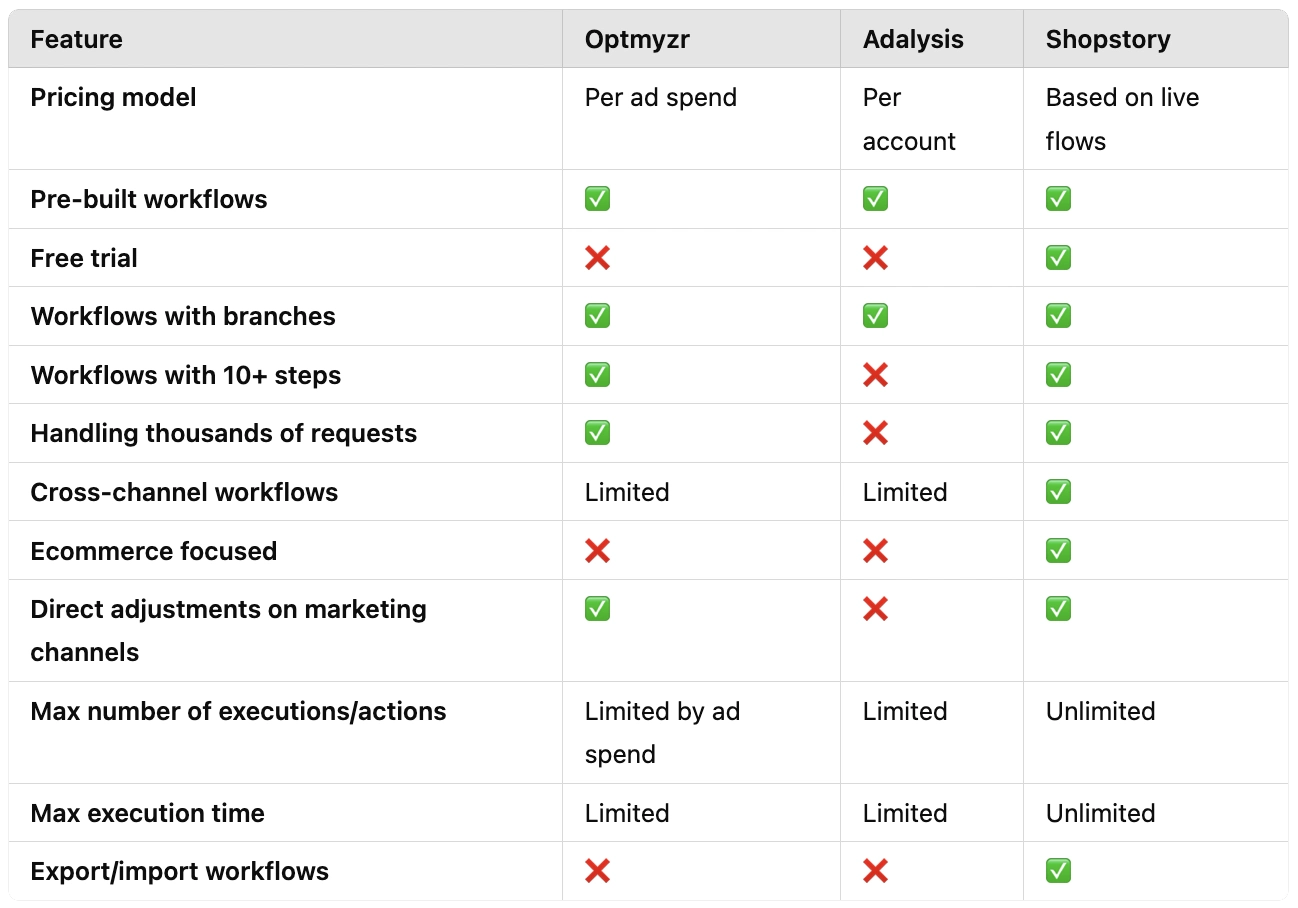MARKETING AUTOMATION
Optmyzr vs Adalysis (and why Shopstory is better)
04.10.2024

When deciding between Optmyzr and Adalysis for managing and automating PPC campaigns, it's essential to consider the tools' features, pricing, and how well they fit your needs. Both platforms are popular among performance marketers and PPC experts, but they serve slightly different audiences. Optmyzr is widely known for its advanced automation and optimization features, while Adalysis focuses more on auditing and improving Google Ads performance with a heavy emphasis on usability. This detailed comparison will break down how Optmyzr and Adalysis stack up, and why Shopstory may be the better choice for online shops, marketing agencies, and performance marketers.
TL;DR
Optmyzr is great for automating PPC tasks and managing multiple campaigns at scale, while Adalysis focuses on streamlining audits and providing actionable insights for optimizing Google Ads. Both platforms cater well to PPC experts but fall short of meeting the specific needs of ecommerce businesses. Shopstory, designed specifically for ecommerce and performance marketing, offers powerful, no-code automations, native integrations, and a pricing model based on workflows.

A head-to-head comparison of Optmyzr vs Adalysis (vs Shopstory)
1. Optmyzr vs Adalysis: A Summary
1.1 Pricing
Optmyzr
Optmyzr charges based on the number of accounts and spend level managed, making it a great fit for agencies or businesses with high-volume PPC campaigns. However, the costs can become prohibitive for smaller businesses or those with fewer PPC accounts.
Paid Plans: Start at $208/month for up to $50,000 in ad spend.
Adalysis
Adalysis uses a more straightforward pricing model based on the number of managed accounts. It offers a simpler, lower-cost solution for businesses that want to focus primarily on Google Ads audits and optimizations.
Paid Plans: Start at $99/month for up to 10 accounts.
Key takeaway
Optmyzr is better suited for larger agencies managing significant PPC budgets, while Adalysis offers a more affordable option for smaller businesses or those with fewer accounts. Both platforms, however, can become costly as usage scales.
1.2 Ease of Use
Optmyzr
Optmyzr offers a highly customizable and feature-rich platform, but its complexity can make it difficult to master for beginners. The wide range of features requires time and effort to fully understand, which could be overwhelming for those new to PPC automation.
Adalysis
Adalysis prioritizes simplicity and ease of use, focusing on audits and optimization tasks for Google Ads. It’s designed to be user-friendly and provides clear, actionable recommendations for improving ad performance. However, it lacks some of the deeper automation capabilities that Optmyzr offers.
Key takeaway
Optmyzr is better suited for advanced users who need a range of PPC automation options, while Adalysis caters to marketers looking for a more straightforward tool to optimize Google Ads without too much complexity.
1.3 Integrations
Optmyzr
Optmyzr integrates primarily with Google Ads and Microsoft Ads, making it ideal for businesses heavily invested in those platforms. Its integration capabilities are well-suited for PPC management but may not extend to other marketing platforms outside of ads.
Adalysis
Adalysis is mainly focused on Google Ads, with less emphasis on integration with other platforms. While this makes it perfect for Google Ads-specific campaigns, it limits users looking for multi-channel PPC management solutions.
Key takeaway
Optmyzr offers broader integration options compared to Adalysis, but both platforms are heavily centered around PPC management for Google and Microsoft Ads. Neither tool is designed for broader marketing automation across multiple platforms.
1.4 Workflow Complexity and Error Handling
Optmyzr
Optmyzr excels in managing complex workflows related to PPC automation. Its customizable rules and advanced optimization options allow users to create detailed workflows with multiple conditions and variables. However, error handling could be more intuitive, especially for users dealing with complex setups.
Adalysis
Adalysis focuses on simplicity and does not support complex workflow automation. While it provides valuable insights and audit tools, it doesn’t offer the same depth in automation capabilities as Optmyzr.
Key takeaway
Optmyzr is the better choice for marketers who need advanced PPC workflows, while Adalysis is more suitable for those focused on Google Ads audits and basic optimizations.
1.5 Scalability and Performance
Optmyzr
Optmyzr is built to handle large PPC accounts and can easily scale up for businesses managing high ad spend across multiple platforms. However, its pricing model can become costly as the number of accounts and ad spend increase.
Adalysis
Adalysis is designed for smaller-scale operations and is best suited for businesses managing a limited number of Google Ads accounts. While it can scale to an extent, it may not be the best solution for businesses looking to manage complex PPC campaigns at a large scale.
Key takeaway
Optmyzr offers better scalability for businesses managing multiple large accounts, while Adalysis provides a more budget-friendly solution for smaller operations.
2. Alternative to Optmyzr and Adalysis: Shopstory
While both Optmyzr and Adalysis are excellent for managing and optimizing PPC campaigns, neither is built specifically for ecommerce businesses or performance marketing across multiple channels. This is where Shopstory comes in, providing a robust, no-code solution that automates ecommerce workflows and marketing tasks at scale.
2.1 Native Integrations with Ecommerce and Marketing Tools
Shopstory excels with its deep native integrations with ecommerce platforms like Shopify, WooCommerce, and Shopware. In addition to this, Shopstory seamlessly integrates with major marketing tools, including Google Ads, Meta Ads, and Google Merchant Center. This ensures that ecommerce businesses and marketing agencies can build complex automations across their entire marketing ecosystem, without needing external development.
2.2 Transparent and Scalable Pricing
Unlike Optmyzr, where pricing is tied to ad spend, or Adalysis, which charges per account, Shopstory offers a more predictable pricing model based on activated workflows. Businesses only pay for the workflows they use, regardless of how many actions or operations take place within them. Starting at €199, Shopstory’s pricing is designed to be scalable, cost-effective, and easy to manage as ecommerce businesses grow.
2.3 Advanced Workflow Capabilities
Shopstory’s no-code platform offers advanced workflow capabilities specifically tailored for ecommerce and performance marketing tasks. Users can automate complex workflows like bid management, budget adjustments, and product feed optimizations. These tasks are difficult to achieve with both Optmyzr and Adalysis without relying on custom-built solutions or technical expertise. Shopstory makes it easy for marketers to create advanced automations without the need for developers.
2.4 Performance Marketing Optimization
Shopstory goes beyond basic PPC management to offer specialized workflows for performance marketing optimization. Whether you’re automating bidding strategies, generating cross-channel reports, or adjusting campaigns in real time, Shopstory offers pre-built solutions designed to enhance ecommerce performance. Unlike Optmyzr and Adalysis, which focus on Google Ads, Shopstory provides multi-channel automation, allowing marketers to optimize performance across several platforms.
- Generate new Meta Descriptions and Meta Titles from Shopify (Shopify, Google Search Console, ChatGPT, Google Sheets): This flow enhances your Shopify product pages by crafting optimized meta titles and descriptions using relevant organic search terms. This helps boost visibility and attract more organic traffic.
- Increase or decrease campaign budget based on weather and ROAS (Google Ads, Google sheets): This workflow uses real-time weather data to optimize your Google Ads campaign budgets, considering both campaign performance and external conditions.
- Create a custom label via supplemental feed for products based on their stock level (Shopify, Google Merchant Center, Google Sheets): Use this workflow to manage stock levels on Shopify, automatically labeling your products based on inventory and adding the data to the Google Merchant Center.
- Check your core web vitals for mobile visitors (Google Search Console, Google Sheets): Monitor pages that don't pass an index status inspection for mobile visitors. You'll receive notifications to improve page performance and user experience.
- Get a weekly report of your top 20 Search Terms and Pages (Google Search Console, Google Sheets): Automatically export top-performing search terms and pages from Google Search Console to Google Sheets weekly to gain valuable insights on performance trends.
- Increase daily Meta ad set budget based on performance (Meta): This flow automatically adjusts your ad set budgets for Meta campaigns based on performance metrics. If certain ROAS and budget goals are met, the budget is increased to capitalize on successful ad sets.
Get Started for Free
Shopstory offers a freemium model that allows businesses to start with a free flow forever, giving users the opportunity to explore all its features and experience how it can streamline ecommerce operations and performance marketing workflows.
Optmyzr vs Adalysis – Our Conclusion
To conclude our Optmyzr vs Adalysis comparison, both are strong tools for PPC management, with Optmyzr offering more advanced automation and Adalysis providing a simpler, audit-focused approach. However, neither platform is tailored to meet the broader automation needs of ecommerce businesses and marketing agencies.
Shopstory stands out as the better alternative, offering deep native integrations, advanced no-code workflows, and a transparent pricing model based on active workflows. It provides the flexibility, scalability, and cost-efficiency that ecommerce businesses need to scale their marketing efforts effortlessly.
Get started for FREE with Shopstory today and see how it can supercharge your business’s automation efforts.
More to Explore
Discover more insights from our latest articles
© 2025, Shopstory









